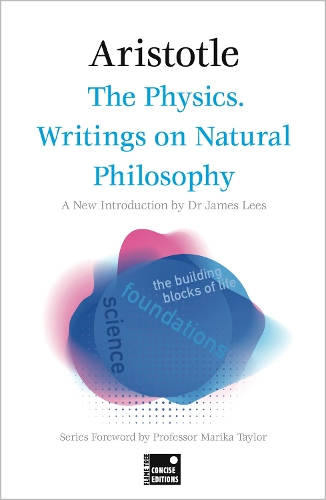
The Physics. Writings on Natural Philosophy (Concise Edition)
(Paperback)
Publishing Details
The Physics. Writings on Natural Philosophy (Concise Edition)
By (Author) Aristotle
Introduction by Dr James Lees
Foreword by Professor Marika Taylor
Flame Tree Publishing
Flame Tree Publishing
31st August 2023
31st August 2023
United Kingdom
Classifications
General
Non Fiction
Philosophy of science
530.01
Physical Properties
Paperback
256
Width 130mm, Height 198mm, Spine 17mm
176g
Description
Aristotle's great work that gave the foundations to Galileo, Isaac Newton and Albert Einstein's much later discoveries about the the natural laws of life and the universe. In the philosophical language of Aristotle and the Greeks of Antiquity Physics roughly translates as 'the order of nature', covering what noe we would differentiate as philosophy, science, politics, humanities and religion. One of Aristotles' great works The Physics is an investigation into the nature of being, of the world and its place in the universe. Although philosophically much broader it provides the foundation for the later work of Galileo, Isaac Newton, and prefigures Albert Einstein's breakthrough theories on time, space and the motion of stars. The FLAME TREE Foundations series features core publications which together have shaped the cultural landscape of the modern world, with cutting-edge research distilled into pocket guides designed to be both accessible and informative. AUTHOR: Aristotle (384322BC) was a philosopher and writer from the Classical period in Ancient Greece. His work provides the intellectual methodology of most European-centred civilization, influencing the fundamental forms of all knowledge. Taught by Plato he went to to write about many subjects including physics, biology, zoology, philosophy, politics, government and the arts.
Author Bio
Aristotle (384322 BCE) was a philosopher and writer from the Classical period in Ancient Greece. His work provides the intellectual methodology of most European-centred civilization, influencing the fundamental forms of all knowledge. Taught by Plato he went to to write about many subjects including physics, biology, zoology, philosophy, politics, government and the arts.
Dr James Lees (new introduction) is a Physicist, Author, and Science Communicator who studied at The University of York and Stanford. He works as a researcher and can be found giving talks and workshops across the UK at various educational festivals on a wide variety of scientific topics. He also has several other books including Physics in 50 Milestone Moments and Who Knew Physics.
Professor Marika Taylor (Series Foreword) is a Professor of Theoretical Physics and Head of School within Mathematical Sciences at the University of Southampton. Her research interests include all aspects of string theory, gravitational physics and quantum field theory. In recent years much of her work has been focused on holographic dualities and their implications. Marika's research has featured in such publications as Physical Review, Journal of High Energy Physics and General Relativity and Gravitation among others.
